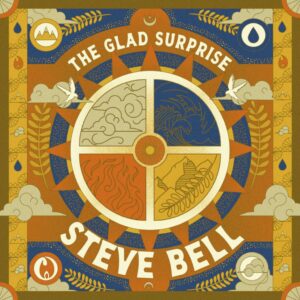[A review of Steve Bell’s album, The Glad Surprise (Signpost Music, 2024).
 On his newest album, The Glad Surprise, Steve Bell reaches out and grabs the heart, the imagination, the despair, the hope, the longing, the pathos and the eros of the soul … and that is all in the first song!
On his newest album, The Glad Surprise, Steve Bell reaches out and grabs the heart, the imagination, the despair, the hope, the longing, the pathos and the eros of the soul … and that is all in the first song!
What is a poor listener to do, but to pour a glass of wine, take a seat and spend the next hour with this amazing album.
“Glad surprise?”
What could be more unlikely?
Where is there any surprise these days?
Upon hearing the news of yet another esteemed Christian leader exposed as a sexual predator, my twenty-nine year old daughter confessed, “Frankly, Dad, this stuff doesn’t surprise me at all anymore.” No surprise. She has simply come to expect such things.
Genocide? School shootings? Lying political leaders?
Climate emergencies? Rising fascism?
No surprise.
Tragedy upon tragedy, bloodshed upon bloodshed?
No surprise.
In the short book that accompanies this album Bell writes:
“These days, with the immediate future looking as alarming as it does, I find my soul trying to see past the inevitable sufferings that widespread social disintegration coupled with the climate crisis might soon bring. Equally, I find myself unsatisfied with familiar, soothing platitudes so easily bandied about in an attempt to quell reasonable fears. Yet, I can’t give up on the possibility of hope either.”
 Bell can’t give up on hope and refuses to close the door on surprise, but he will not reach for the cheap optimism of pious platitudes. If Bell is going to find hope, he’ll go to the places of deepest despair. And so the album’s opening and title track begins:
Bell can’t give up on hope and refuses to close the door on surprise, but he will not reach for the cheap optimism of pious platitudes. If Bell is going to find hope, he’ll go to the places of deepest despair. And so the album’s opening and title track begins:
Jesus of the Nazi gallows
Jesus of the lynching tree
Jesus of the Gazan rubble
Jesus of the refugee
Jesus of the queer beleaguered
Jesus of the hunted child
Jesus of the missing women
Native to the sacred wild
Jesus has been getting a lot of press these days,
but the question is “which Jesus?”
We all know about the …
Jesus of the neo-fascist,
Jesus of the racist lie,
Jesus of nationalist idolatry,
Jesus of xenophobic hate.
And there are no surprises with that Jesus.
He behaves exactly as he has been told, exactly as we would expect.
Bell, however, looks for Jesus elsewhere.
If there is to be any surprise from this Jesus,
indeed, if there is to be any remote possibility of a “glad surprise,”
then Jesus will be found at the places of deepest suffering,
violence and injustice.
Whose Jesus is this? Where will this Jesus be found?
 In the Nazi gallows,
In the Nazi gallows,
the lynching tree,
under the Gazan rubble,
in the frightened and despairing eyes of the refugee,
in the beleaguered queer community,
amongst the children of abuse,
and with the missing women and children.
That’s where you will find Jesus!
Bell has put it all on the table,
and we are only two stanzas in
to this incredible artistic accomplishment.
With a musical nod to John Coltrane’s “A Love Supreme” and a soulful tenor sax solo, “The Glad Surprise” is a pulsing jazz tune that takes us to the heart of the matter before a word is sung.
But once those opening lines have identified which Jesus we are talking about,
and where that Jesus might be found,
what is left for us except to sing,
“Oh, what love …” as the chorus.
And then, with poetic/lyrical help from Malcolm Guite,
the song goes deeper into the identity of this Jesus,
rehearsing both the story of birth, death and resurrection,
and confessing that this Jesus
is nothing less than the cosmic centre of all creation,
pleased to hold “all things together.”
This is the Jesus of “the midnight struggle” of Gethsamene,
the betrayed one, the one who embraces darkness and despair on the cross.
This is the …
Jesus of the great reversal
Jesus of the glad surprise.
There it is.
In the face of the boring predictability of the crises of our times,
Bell announces a glad surprise.
But note that this isn’t a glad surprise found by looking
“past” the inevitable sufferings of social disintegration
and climate collapse
but precisely in the midst of such suffering.
You see, that’s where this Jesus is to be found.
At the heart of the current social disintegration
is the erasure of difference.
And such erasure is inevitably violent.
 Whether we are talking about genocide that seeks to eliminate whole people groups,
Whether we are talking about genocide that seeks to eliminate whole people groups,
a xenophobia that gleefully talks about the deportation of masses of people who are “poisoning” our nation,
or a transphobia and homophobia that will dismiss as deviant millions upon millions of people,
it is all driven by an erasure of difference.
Having begun with the Jesus who is found at the heart
of suffering and exclusion,
how might a Jesus-shaped imagination
help us to find further glad surprises
on the path to healing our murderous divisions?
Well, how about a meditation on what it means
to be created in the image of God,
followed by a celebration of creational diversity,
and brought home with an invitation into the neighbourliness
that is the heart of the city of God?
That’s precisely where Bell goes in the next three songs.
“The Divine Image” is Bell’s liltingly Celtic folk rendition of William Blake’s poem of the same name.
If an ethos of exclusion is driven by harshness, cruelty, enmity and hatred,
then a Christian imagination is shaped by the virtues of
“Mercy, Pity, Peace and Love.”
In such “virtues of delight” we enter into the heart of God,
and in Jesus these virtues take flesh, “a human form divine.”
Therein, Blake discerns, and Bell sings,
is the inherent worth of all humanity,
evocatively offered in the repeated final stanza:
And all must love the human form
In every stripe and hue
Where Mercy, Love and Pity dwell
There God is dwelling too
Created in the image of the God of mercy, love, and pity,
taking our lead from the image of that God incarnate in Jesus,
we are called to recognize and love the human form of that love,
manifest in all of humanity.
By these terms,
the exclusions that are firing our social disintegration
are nothing less than blasphemy.
But maybe Blake is a little too heavy for us.
While Blake does indeed have the poetic power
to liberate our captive imaginations,
maybe we need to move from the depths of Blake’s poetics
to the relative simplicity of a children’s song.
Upon first listening, Bell’s rendition of Tim Huff’s
delightful poem, “Bunnies Don’t Run”
comes as a welcome bit of levity on the album.
After “Jesus of the Nazi gallows”
and the profundity of Blake’s meditation on the divine image,
maybe Bell thought that we needed a breather,
a moment of imaginative rest.
Bunnies don’t run—they hop, hop, hop
Ponies don’t skip because they trot, trot, trot
When the birds fly high, the fish don’t care
‘Cause everyone’s different, everywhere
And so the song goes, offering a child’s taxonomy of creation.
Carrots, bananas, berries, oceans, rivers.
All wonderful creatures, all different.
But that’s the point.
You see,
If people were everywhere the same, same, same
That would be so sad, such a terrible shame
Love them all and say a prayer
For everyone different, here and there
For everyone different everywhere
And so the beautifully rich diversity of creation
delightfully celebrated in a children’s song,
serves as another imaginative antidote
to the culture of violent exclusion,
and behold, another glad surprise is possible.
The fourth track, “One Can Hope,”
has a pop song kind of hook to it that can be deceptive.
The opening lines, “some are born indigenous/some are born a stranger”
can lead the listener to make some assumptions
that will end up missing the depths, and indeed, the pathos of this song.
It is all there in the next two lines and refrain:
Some are born ambiguous
Yet born to be a neighbour
In the glad garden city of God
In the glad garden city of God
Here, the book of essays on the songs
that Bell includes in this album, is crucial.
You see, this is not a song about “indigenous” peoples per se.
No, this is a song about sexual and gender diversity,
together with the mental health crisis that has risen
to epidemic proportions in our time.
Some are born indigenous.
Some folks are born with bodies in which they are at home.
But some are strangers to their bodies, experiencing gender dysphoria,
even as they are strangers in their own homes and communities.
However you are born, Bell confesses,
you are born to be a neighbour
in the glad garden-city of God.
Your life may be one of unremitting sorrow,
burdened by weariness,
yearning for a new day tomorrow,
a life of inexorable longing …
but within the moral vision of Jesus,
you are a neighbour, welcomed into the garden-city of God.
Admittedly, it doesn’t look that way,
the complexity of it all can be overwhelming,
and “there’s more going on than you know,”
but Bell is a singer of songs of hope,
and lovingly reaches out to his audience as neighbours
in the city of God.
The image of God,
the rich diversity of creation,
and the call to love our neighbours.
Here is the foundation for a liberated imagination.
But what if the image of God is defaced by idolatry,
creation is despoiled by greed,
and love is a dangerous practice in a culture of hate?
Well, maybe it is time to sing Bruce Cockburn’s “Lovers in a Dangerous Time.”
Whether a Cockburn song appears on a Bell album or not,
the musical and lyrical influence of this stellar artist is never too far away.
And “Lovers” makes total sense on The Glad Surprise.
You see, this whole album happens in that tension between
“waiting for the sky to fall,”
while being “dazzled by the beauty of it all,”
Creational delight and apocalyptic dread.
There is an urgency to the crises of our times,
and so there’s “never a breath you can afford to waste.”
We may well be opened anew to glad surprises by the album,
but those surprises are against the odds,
against the principalities and powers of the age.
We may be singing, “Oh, what love” on the first track,
but there is no denying that we are “lovers in a dangerous time.”
Even though Bell’s tone on this album doesn’t carry
the militancy of “kicking at the darkness until it bleeds daylight,”
he knows as deeply as any of us that
there is something more going on here
than struggles with flesh and blood, political agendas and ideologies.
This contest of imagination, the wresting of love out of hate,
is a spiritual conflict of life and death.
And while we are in the midst of that conflict,
we don’t win this one on our own.
We are called to struggle with the spiritual forces around us,
but the victory must always be received as a gift,
not an accomplishment.
Maybe that is why Bell includes Byron O’Donnell’s
“A Reason for it All” at this point in the album.
With its quiet confidence and hope,
O’Donnell’s simple country gospel song,
rests in a grace that functions as a gentle
corrective to the militant spirit of the Cockburn song.
And, as if to underline the shift in tone,
Bell then drops a delightfully playful guitar piece
onto the album.
Titled, “This too, is true,”
this song bears witness to an unencumbered joy,
as if to say, that beyond all of the words that have been sung
– perhaps especially the words of sorrow and struggle –
this moment of musical exuberance also bears witness
to a truth that just might set us free.
And if that is true, then perhaps we can recognize that,
This is the day to leave the dark behind you
Take the adventure, step beyond the hearth
Shake off, at last, the shackles that confined you
And find the courage for the forward path
Returning to Malcolm Guite,
“A Lovely Longed-for Blue,”
is a song of new beginnings,
of spiritual renewal in solidarity
with a creation being redeemed.
There is something paralyzing about fear, anger and anxiety.
Division, disintegration, and despair can strip you of the courage to move on.
But this whole album has been about inspiring that courage
and setting us free from such paralysis.
And maybe that is why only now,
almost at the end of this collection of songs,
Bell offers the invitation to put on our walking shoes.
You yearned for freedom
Through the long night watches
The day has come
And you are free to choose
To set aside your still familiar crutches
To step into the lovely, longed-for blue
After the “dimly burning wick of winter”
might you discern anew the “Lenten sun” shining a path forward?
So…
Breathe deep and be renewed by what you’re breathing
Kinned to the keen east wind and the cleansing air
As though the blue itself were blowing through you
As though you always knew you’d find it there.
And such a blowing wind takes us to the penultimate song.
Again, teaming up with Malcolm Guite,
“Pentecost” is a hymn of liberation,
healing and restoration of all of creation.
In a world where people can’t hear each other
speaking across their hardened national,
ideological and religious borders
on the day of Pentecost …
The right words come today in their right order
And every word spells freedom and release
Today the gospel crosses every border
All tongues are loosened by the Prince of Peace
And that would be a fine place to end this album.
Things would come to their proper resolution,
the promised comforter would be proclaimed,
and we would confess anew that in the Spirit,
our “mother-tongue is love in every nation.”
Except that it wouldn’t be true.
There would be too much light.
So Bell brings us back one more time to darkness
in the concluding track, “This Dark Hour.”
But this time it is the darkness of an apostate church
held captive by the idolatry of Christian nationalism.
In this triumphalism, in this exceptionalism,
this clinging to glory and power,
the church becomes a “lordless power.”
No longer subject to a Lord enthroned on a cross,
the church is too busy securing its own “lordship”
to be open to any radically new glad surprises in her life.
Then all is lost.
Then hope remains incognito, in disguise.
Then we remain captive in this dark hour.
And so, the concluding song takes us back to the beginning.
Jesus of the Nazi gallows, Jesus of the suffering path.
In the opening song we heard of …
Jesus of the crucifixion
Darkness and despairing cries
Jesus of the great reversal
Jesus of the glad surprise
and now Bell sings …
There still remains in this dark hour
The mystery of our Saviour’s cross
For in that cross is dearly nestled
Hope eternal in disguise
By way of suffering-love he leads us
To God’s glorious and glad surprise
There is no glad surprise apart from embracing the world in suffering.
There is no glad surprise in grasping at power.
There is no glad surprise in being a “winner.”
There is no glad surprise in gaining the world.
Rather …
… should we learn the art of losing
Letting go and giving way
We might find beyond the darkness
A glad surprise on Easter Day
From glad surprise to glad surprise, this album is a masterpiece.
But more importantly, The Glad Surprise
is a prophetic and priestly gift
that will serve to liberate our imaginations,
and animate our lives with hope.
2 Responses to “Steve Bell’s “The Glad Surprise” lives up to its name.”
Waldy Derksen
ballistic minds without a clue
prophetic mining of the soul
jolt from out beyond the blue
partial Jesus rendered whole
glad implies a path to joy or something like it
surprise implies a twist, an unforeseen deviation
a change to the expected historical trajectory
“glad surprise” is a precise yet spacious presentation of the good news
Stephen Murphy
Great review. Waldy…who knew a lawyer could be so poetic…a glad surprise.